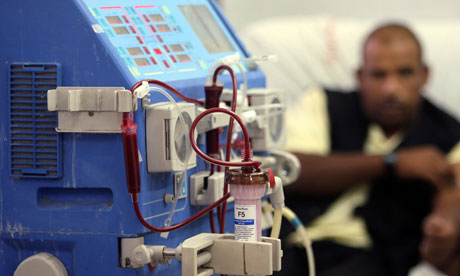
One sign of kidney failure is the effect it has on the bodily functions you normally take for granted. As one of the kidneys' main jobs is to turn waste products into urine, when they stop working, you don't pee so much. So, like various seas around the world, I'm drying up.
As a way of monitoring the decline, my hospital in London - the Royal
Free in Hampstead - asked me to measure the amount I produce. One evening before going to bed, I dug out the measuring jug from the kitchen cupboard and can now confirm that I'm managing around 200ml a time.
Not that I have to confirm this to my long-suffering wife. The following morning, she found the jug and its mysterious contents that I had forgotten to dispose of and had accidentally left on the draining board.
She thought it was unused chicken stock and, after pondering whether or not to freeze it for future use, poured it away. Quizzing me about it later, as it had occurred to her that we hadn't had roast chicken in weeks, I shamefacedly had to explain what it was and why I had micturated into a cooking vessel. I suppose we should be grateful it didn't end up in what would have been a very unappetising version of pee soup.
Now that my creatinine level - a simple measurement of how well the kidneys are working - has soared to above 800, the time has come to start dialysis again. Last time I was on dialysis, it lasted two years. My left forearm is a permanent reminder of this torturous procedure.
The hospital has to create a fistula, or surgically enlarged vein, to provide access to the bloodstream for haemodialysis. Every session, two massive needles are stabbed in to this huge, buzzing vein to draw the blood through the dialysis machine and back in again after cleansing.
Two years of these needles have left scarring that resembles sickly snakeskin. As well as the dialysis marks, I also have surgical scars from the fistula. Rachel calls it my "terror-wrist".
This time, as we are waiting to see if Rachel can donate one of her kidneys to me, I may only have to dialyse for a couple of months until
I can have another transplant.
So, this week it's back to the Royal Free for a small op to put a temporary plastic tube in one of the blood vessels in my neck. This "neckline" will allow me to have dialysis three times a week for around four to five hours a time. I should actually start to feel a lot better for having some of the toxins removed from my bloodstream. At the moment I feel like I'm malfunctioning, running on empty, living life in slow motion.
If Rachel is able to donate one of her kidneys the hospital is keen to do the transplant as soon as they can. They say this could happen as early as September, if everything goes to plan. She is going to the Royal Free for a whole day of tests at the end of July and we should find out soon afterwards whether or not she can be a donor. It is exciting and terrifying in equal measure.
• If you would like to join the Organ Donor Register and help to save
someone's life, you can do so here: organdonation.nhs.uk.

